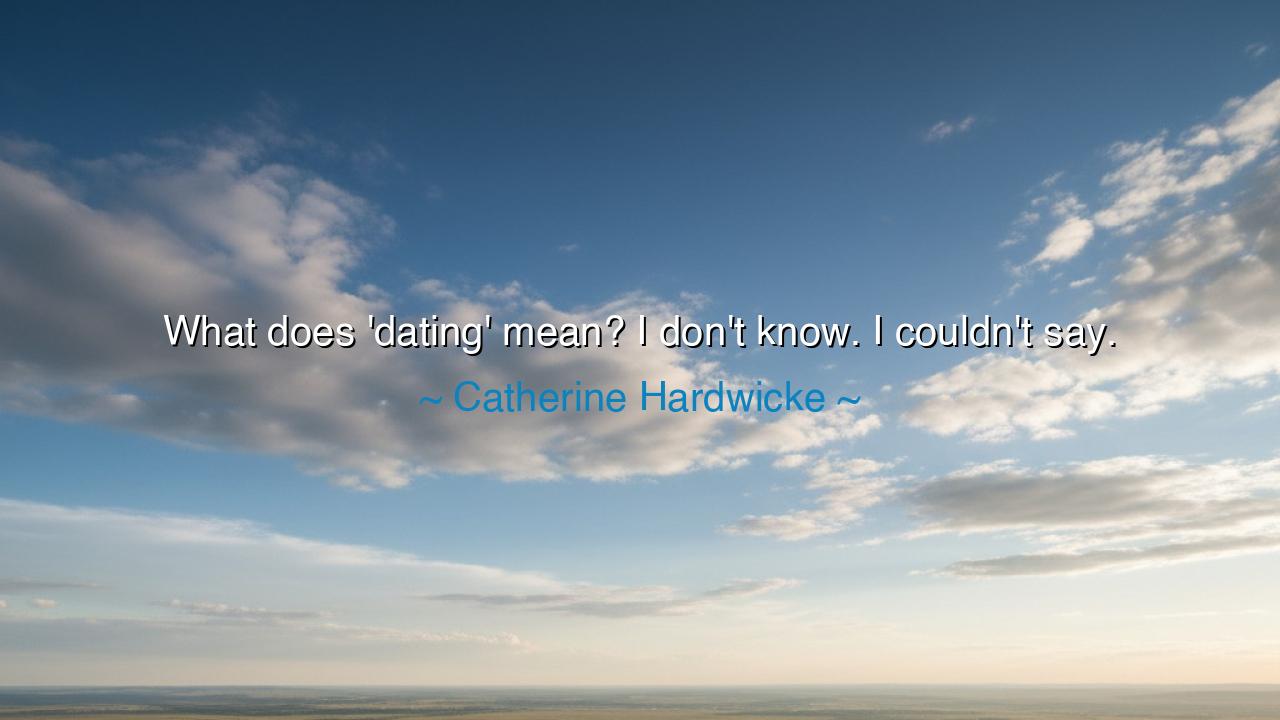
What does 'dating' mean? I don't know. I couldn't say.






A maker of images and stories lifts her hands and shrugs before the crowd: “What does ‘dating’ mean? I don’t know. I couldn’t say.” Do not mistake this for ignorance; hear it as a gong sounded in a hall of shifting mirrors. The word dating is a vessel whose contents change with every shore. Some fill it with courtship, some with casual wandering, some with trial and error, some with ritual and vow. To confess I don’t know is to honor how language limps behind experience, and how our age has made a labyrinth of the heart with entrances everywhere and very few clear signs.
The ancients would recognize the riddle. In one city, love was weighed in contracts; in another, sung through latticed windows. In the courts of Provence, troubadours praised an unattainable lady; in the ballrooms of Regency England, a dance was a declaration in code. What, in those worlds, did dating mean? A chaperoned promenade? A letter sealed in wax? A family’s negotiation? The forms differed, yet each time and place believed its own custom self-evident. Our era has multiplied customs without consolidating meanings; hence the honest verdict: I couldn’t say.
Consider a story from the tea-scented pages of Heian Japan. Lovers wrote poems on folded paper, scenting them with incense so that even the fragrance spoke. A single syllable placed just so could open or close a future. There was no “dating” as we use it, yet the trembling negotiation of attention and intention was present in every brushstroke. Now, replace scroll with screen, incense with notification. The instruments have changed; the ambiguity remains. Who owes what to whom, after how many exchanges, under what unspoken law? Again the baffled wisdom: I don’t know.
Or look to Jane Austen’s assembly rooms in Bath. There, a gentleman’s bow and a lady’s acceptance of a set were freighted with rules that most moderns have forgotten. An invitation, a refusal, a second approach—each step was choreographed. Today we meet in coffee shops, on apps, in shared workspaces. The choreography has loosened, but the stakes are the same: to risk saying “shall we?” without knowing whether the other hears “forever” or merely “for now.” In that gap between intent and interpretation lives the humility of I couldn’t say.
The quote also exposes how power and expectation tangle the word. For some, dating means audition—perform and be judged. For others, apprenticeship—practice the arts of listening, boundary-setting, repair. For still others, pilgrimage—seek the one with whom a household can be built. When two people approach with different dictionaries, even kindness can bruise. The statement I don’t know becomes not a dodge but a discipline: pause, ask, define before you entwine.
Here, then, is the elder’s lesson disguised as a sigh: when a word is fog, make lanterns. Do not let culture’s vagueness draft your heart into confusion. Ask the bright questions early—“What does dating mean to you? What are we testing? What are we guarding?”—not to kill romance, but to keep it from starving on mixed signals. Precision is not unpoetic; it is the trellis on which affection can climb without strangling itself.
Take these rites for the road. (1) Before the second meeting, trade definitions: three sentences each on what dating means right now in your life. (2) Replace assumption with invitation: “I don’t know what you prefer—shall we decide together?” (3) Keep a ritual of clarity: after an evening, one message that names what you enjoyed and what you hope for next; let silence be an answer, but never a strategy. (4) When meanings diverge, part with blessing, not blame; the labyrinth has many exits, and grace makes them wider. Walk this way, and the honest confession—I couldn’t say—will become the beginning of shared language, and shared language the beginning of a love that knows what it is.






AAdministratorAdministrator
Welcome, honored guests. Please leave a comment, we will respond soon